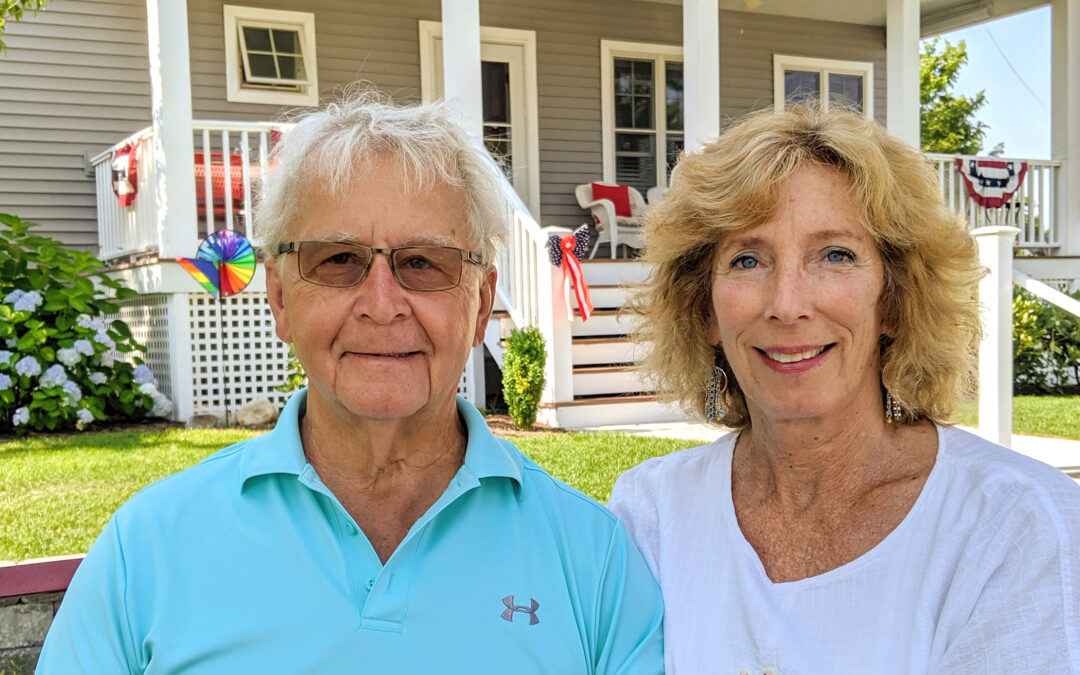“You have to change your ethos. When you’ve always saved, it’s hard to spend. So when you do spend, you want it to be worthwhile.” – Joyce Cawthon
Joyce and Andy Cawthon have always wanted to make a difference in the world. Joyce has a background grant writing for Ottawa County, and Andy treats every day like a treasure. “Doing for others permeates from him,” said Joyce. “Whether it’s picking up trash, helping others, or acting as an unofficial ambassador of Grand Haven.” They go to C3, they compost and have a vegetable garden, and they even helped start the community garden behind the Salvation Army.
“I’ve always been inspired to make an impact,” said Joyce. “So when we learned that we were required to take or make a distribution, we had to decide what to do with the money that we’d spent our lives saving.”
“Required minimum distribution is a fact of life,” added Andy. “At my age, I’m in a position where the money is distributed no matter what, so I may as well be able to direct it towards creating a charitable impact.”
The Tax Cuts and Jobs Act of 2017 made it more difficult for many to itemize their charitable contributions. If you fall into this category and you are 70 ½ or older, you may want to inquire about a provision in the law that allows individuals to make charitable contributions directly from your IRA. Known as a Qualified Charitable Distribution (QCD), this strategy allows you to direct all or part of your Required Minimum Distribution (RMD) directly to charity. The amount of the QCD is not an itemized deduction on your tax return—it’s even better. It is excluded from your taxable income completely! So, if you are required to take RMDs from your retirement plans and intend to donate to charity anyway, a QCD may be a much more tax-efficient way to do it.
 The Cawthons chose to open a named greatest needs fund because “there is great value in pooling resources with other people of a similar mind,” said Andy. “My individual giving might not have an impact on a pressing community need, and if I’m picking the beneficiary, how do I know if I’m picking the best thing? We trust the foundation to make that decision for us.” By making an unrestricted contribution to the foundation, the Cawthons can rest assured that today, tomorrow, and forever those resources will be invested wisely and with a focus on impact.
The Cawthons chose to open a named greatest needs fund because “there is great value in pooling resources with other people of a similar mind,” said Andy. “My individual giving might not have an impact on a pressing community need, and if I’m picking the beneficiary, how do I know if I’m picking the best thing? We trust the foundation to make that decision for us.” By making an unrestricted contribution to the foundation, the Cawthons can rest assured that today, tomorrow, and forever those resources will be invested wisely and with a focus on impact.
“It doesn’t take a ton of money to start serving the greatest need,” Joyce continued. “We can be a little starfish that can add to the other starfish. We can be a drop in the bucket, a tiny pebble. Maybe in the future we can be a bigger pebble. But start with the drop in the bucket, then adjust the faucet up and down as needed.”
 Joyce was familiar with the community foundation because of friends’ connections and from her work with Ottawa County, but Andy first took notice while raising money for the Musical Fountain Sound Audio Project. “The funds at the foundation that responded to that need showed me what kind of impact we could have. The impact of one individual gift is minimal for a community need, but together we can really help people.”
Joyce was familiar with the community foundation because of friends’ connections and from her work with Ottawa County, but Andy first took notice while raising money for the Musical Fountain Sound Audio Project. “The funds at the foundation that responded to that need showed me what kind of impact we could have. The impact of one individual gift is minimal for a community need, but together we can really help people.”
The Cawthons also wanted to continue to model philanthropy for their children and grandchildren, and appreciate the flexibility of a greatest needs fund. “We want to show them that helping others is a core value,” said Andy. “Flexibility is the key to our life with nine grandchildren, and we teach them that.” Knowing that the foundation’s grant’s committee does the work of deciding the greatest need at that time reduces the stress of making that decision on their own.
“People have to get over the fear of doing something like this,” said Joyce. “You don’t have to be rich, you just have to want to do good for the community. You can do a little, medium, or big, but you should do good.”
The House of Representatives passed the Setting Every Community Up for Retirement Enhancement Act (SECURE Act) on May 23, 2019. If the bill passes the Senate and is signed by the president, it could lead to shifts in retirement savings and planning. One shift that may be of particular relevance related to this post is that if this bill passed as is, it would push back the age at which retirement plan participants need to take required minimum distributions, from 70½ to 72.
The GHACF does not provide tax or financial advice and encourages all current and prospective donors and fund holders to consult with their professional advisors when considering and/or making a gift.
To learn more about opening a fund, visit ghacf.org/donors/ or email Chris Riker, VP of Advancement & Donor Services, at criker@ghacf.org.
